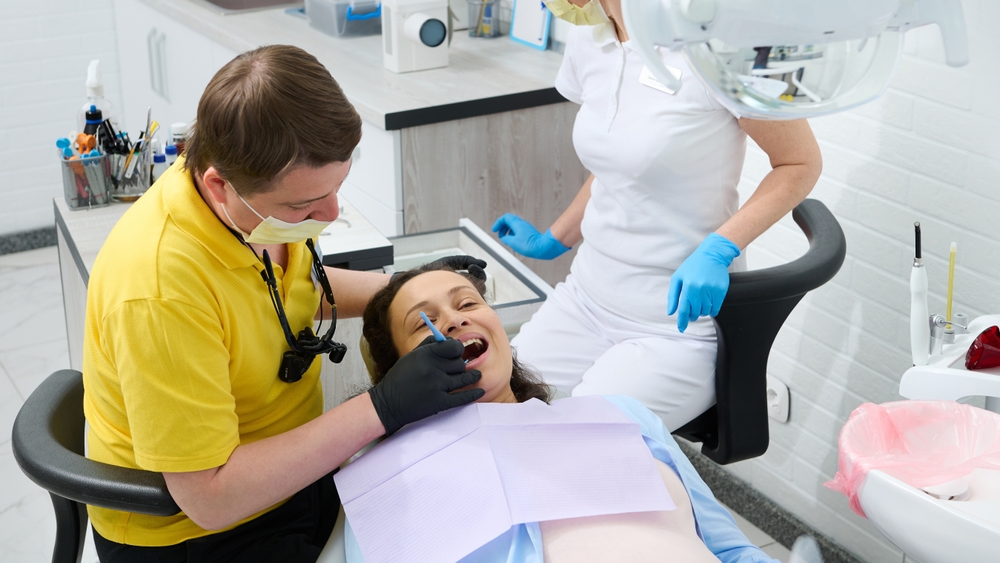Medical Disclaimer: This information is for educational purposes only and is not intended to replace professional medical or dental advice. Always inform your dentist and obstetrician that you are pregnant before any procedure, and follow their individualized guidance.
Did you know that silent dental problems can affect your pregnancy outcome? Cavities and gum infections may take months, or even years, before they hurt. During that time, bacteria spread through your body. Research links gum disease to a 3.5-fold increase in low birth weight and significantly higher odds of having a baby small for its gestational age. Pregnancy oral health, including getting your cavities filled, is an important topic worth exploring.
Oral health could raise a pressing question for expectant mothers — Is it safe to get your cavities filled while pregnant? Taking care of your health now will prevent problems later. An oral infection might not always cause pain, but the bacteria will still spread to the bloodstream. If left untreated, the bacteria could lead to complications during your pregnancy. What seems like a small cavity could affect your health and your baby’s development.
How Pregnancy Affects Cavities and Oral Health
While few resources recommend maternity dental checkups, you should always have your oral health checked. A study revealing the hormonal and lifestyle effects of pregnancy on your oral health highlights these essential dental considerations during pregnancy:
- Hormonal influence: During pregnancy, hormones like estrogen and progesterone increase, driving gum disease and oral decay, and contributing up to 45% of dental decline.
- Oral hygiene neglect: Morning sickness and nausea can cause oral hygiene to take a backseat, worsening gum inflammation and cavities through poor brushing and flossing habits.
- Vomiting episodes: The frequency of vomiting and acid exposure does not significantly impact oral health outcomes, according to study participants.
- Oral microbiome shift: Hormonal changes support the growth of harmful bacteria such as Porphyromonas gingivalis, which worsens gum disease.
Regular checkups, including getting your cavities filled, are essential as many of the shifts in your oral health go unnoticed without a checkup. Hidden dental problems create pathways for harmful microorganisms to circulate throughout your system. This ripple effect threatens both your health and your unborn baby’s development.
These changes make it even more crucial to know what safe treatment alternatives are available during pregnancy.
Can You Get Cavities Filled While Pregnant?
Yes, you can confidently get fillings during pregnancy. Many leading medical organizations give the green light for expectant mothers to get their cavities treated during their pregnancies. The American Dental Association finds that oral health care is safe at any point during pregnancy, including dental radiographs and local anesthesia.
Dental radiographs are diagnostic tools that help your dentist evaluate oral health and detect issues not visible to the eye. They are not a treatment procedure.
The American College of Obstetricians and Gynecologists (ACOG) agrees that emergency treatments, such as extractions, root canals, or restorations, are safe during pregnancy. A delay in treatment might lead to more complex problems.
Another study finds that women who get dental fillings, extractions, or even a root canal during the second trimester of pregnancy don’t have higher rates of issues at birth. The second trimester may even be more physically comfortable regarding nausea and lying in the chair. Non-emergency dental treatments, including fillings, are best scheduled during the second trimester as most of your baby’s major organs have formed by this time, reducing potential risks.
The next important consideration is the safety of treatment during pregnancy. Understanding these risks makes this question even more significant.
Are Anesthesia and Fillings Safe During Pregnancy?
Local anesthetics such as lidocaine and bupivacaine are generally considered safe during pregnancy when medically necessary and administered by a qualified dental professional in consultation with your obstetrician.
The U.S. FDA advises against the use of dental amalgam fillings during pregnancy due to mercury exposure concerns. If you need a cavity filled, ask your dentist for a mercury-free composite resin filling.
Fillings are harmless, but avoiding treatment is significantly more dangerous.
Why Untreated Cavities in Pregnancy Are Riskier Than Fillings
One of the dangers of neglecting or avoiding dental care when you have gingivitis is periodontal disease. You’ll have a series of infections in the gums, and over time, this results in problems with the bone structure that supports the teeth. When a disease affects the bone structure in your mouth, you might have to have your teeth extracted.
Pregnancy increases your chances of severe tooth decay if you leave the cavities untreated. The bacteria can reach the inner parts of the tooth and infect the nerves and the pulp. When the pulp is infected, it leads to a painful abscess.
In emergency cases such as tooth and gingival inflammation, the infection can be more harmful to the baby than the actual dental procedure. Leaving severe inflammation and pain untreated during pregnancy can result in a more harmful emergency that may lead to general anesthesia, surgery, hospitalization, and premature delivery.
Tips for Preventing Cavities During Pregnancy
Your hormone levels increase during pregnancy, which affects your dental health. About 60-75% of pregnant women develop pregnancy gingivitis, and the symptoms include sensitive gums that are prone to bleeding. While it’s tempting to dismiss it as another pregnancy symptom, it’s a real condition that needs attention. A few ways to improve your dental health include:
- Practice good dental hygiene, including daily brushing and flossing
- Rinse your mouth after morning sickness
- Eat a balanced, low-sugar diet
- Stay hydrated
- Schedule regular dental checkups
Talking with Your Dentist During Pregnancy
Open communication with your dentist during pregnancy can help you safeguard the health of your mouth and prevent dental hygiene-related complications. Not all dental treatments are tested for safety during pregnancy, so it’s important to let your dentist know you’re expecting. If you need to go in for a procedure, they’ll know to use pregnancy-safe materials and anesthesia. Here are tips when talking to your dentist when you’re pregnant:
- Share your pregnancy details early
- Discuss all medications and supplements
- Ask about safe treatment timing
- Talk about local anesthesia
- Mention any sensitivities or anxiety
- Bring up any oral changes
- Ask for preventative guidance
The Importance of Dental Care During Pregnancy
Caring for your dental health, including getting your cavities filled during pregnancy, deserves the same attention as your prenatal scans. By taking this proactive step, you significantly reduce the risk of harmful dental bacteria affecting both your health and your baby’s well-being.
Regular checkups and a good dental hygiene routine are key to a healthier pregnancy and avoiding postpartum cavities. Explore more resources from The Dental Medical Convergence, Inc., and take the next step toward protecting both your smile and your pregnancy.




